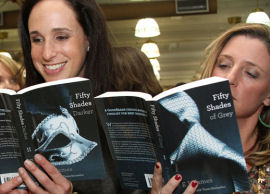21 March 2013
Emotional content of books diverging by country, say language sleuths
by Will Parker
 A computer analysis of more than five million digitized books has revealed a distinct stylistic divergence since the 1960s, with American books becoming decidedly more "emotional." That's according to researchers from the Universities of Bristol, Sheffield, and Durham, who looked at how the use of "mood" words in books has changed over time. Their study appears in the journal PLOS ONE.
A computer analysis of more than five million digitized books has revealed a distinct stylistic divergence since the 1960s, with American books becoming decidedly more "emotional." That's according to researchers from the Universities of Bristol, Sheffield, and Durham, who looked at how the use of "mood" words in books has changed over time. Their study appears in the journal PLOS ONE.
The analyzed words were divided into six categories - anger, disgust, fear, joy, sadness, and surprise. In applying this technique, the researchers made some intriguing discoveries about the evolution of word usage in English books over the past century.
Firstly, the results show the emotional content of published English has been steadily decreasing over the past century, with the exception of words associated with fear, an emotion which has resurged over the past decades.
"We were initially surprised to see how well periods of positive and negative moods correlated with historical events. The Second World War, for example, is marked by a distinct increase in words related to sadness, and a correspondent decrease in words related to joy," noted the University of Bristol's Alberto Acerbi, lead author of the study.
The researchers also found that American English and British English have undergone a distinct stylistic divergence since the 1960s. They say that American English has become decidedly more emotional than British English in the last half-century.
The same divergence was also found in the use of content-free words, that is words which carry little or no meaning on their own, such as conjunctions ("and", "but") and articles ("the"). "This is particularly fascinating because it has recently been shown that differences in usage of content-free words are a signature of different stylistic periods in the history of western literature," noted Acerbi. This, he adds, suggests that the divergence in emotional content between the two forms of English is paired by a more general stylistic divergence.
The researchers aren't sure exactly what happened in the 60s to trigger the British-American divergence. "We can only speculate whether this was connected, for example, to the baby-boom or to the rising of counterculture," said Acerbi. "In the USA, baby boomers grew up in the greatest period of economic prosperity of the century, whereas the British baby boomers grew up in a post-war recovery period so perhaps 'emotionalism' was a luxury of economic growth."
A remaining question, the researchers say, is whether word usage represents real behavior in a population, or possibly an absence of that behavior which is increasingly played out via literary fiction. "Books may not reflect the real population any more than catwalk models reflect the average body," observed Acerbi.
Related:
Discuss this article in our forum
Couples' language use predicts relationship success
Language transforming medicine... for the worse
Say what? Ambiguity makes language more efficient
Tweet this: human language may have evolved from birdsong
Source: University of Bristol
